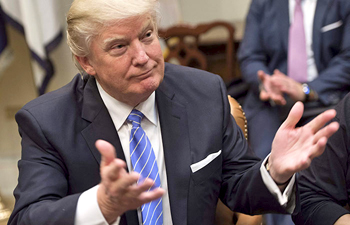Washington, Jan 30: President Donald Trump insisted on Sunday that his executive order temporarily halting travel from seven majority-Muslim countries+ was "not a Muslim ban," after it was met with confusion, global outrage and huge protests+ across the United States.
 "America is a proud nation of immigrants and we will continue to show compassion to those fleeing oppression, but we will do so while protecting our own citizens and border. America has always been the land of the free and home of the brave," Trump said in a statement.
"America is a proud nation of immigrants and we will continue to show compassion to those fleeing oppression, but we will do so while protecting our own citizens and border. America has always been the land of the free and home of the brave," Trump said in a statement.
"This is not about religion — this is about terror and keeping our country safe," he said, adding that more 40 Muslim countries were not affected by his order.
His defense came+ in the form of an official written statement issued by the White House, a rare move for a president who has favored speaking directly to his audience via Twitter.
The president singled out the media, which he has attacked repeatedly since coming into office just over a week ago.
"We will keep it free and keep it safe, as the media knows," he said, referring to the United States.
"To be clear, this is not a Muslim ban, as the media is falsely reporting."
Trump signed the executive order on Friday, suspending the arrival of all refugees+ for at least 120 days, Syrian refugees indefinitely and barring citizens from Iran, Iraq, Libya, Somalia, Sudan, Syria and Yemen for 90 days.
While Trump has cited the September 11, 2001, attacks as justification for his move, he did not target any of the 9/11 hijackers' home countries — Egypt, Lebanon, Saudi Arabia and the United Arab Emirates.
Judges in at least four states with major international airports — Massachusetts, New York, Virginia and Washington — issued temporary stays to block parts of Trump's executive order, preventing authorities from deporting people who had been detained.
Trump recalled that his predecessor Barack Obama, a Democrat, had paused for six months in 2011 the Iraqi refugee program.
And he stressed that the seven countries targeted by his ban were also listed by Obama.
But the previous administration's restrictions were of a different sort, requiring visas for people having traveled to those countries in the past five years.
"We will again be issuing visas to all countries once we are sure we have reviewed and implemented the most secure policies over the next 90 days," Trump added.
"I have tremendous feeling for the people involved in this horrific humanitarian crisis in Syria. My first priority will always be to protect and serve our country, but as president I will find ways to help all those who are suffering."





Comments
Why are 13 Muslim countries banned Israelis from entry ?
As per their claim 19 people who hijacked airlines on 9/11 were from GCC, namely, 15 from Saudi, 2 from UAE, 1 from Lebanon and 1 from Egypt.
But, no ban on above countries. If he really has DUM, should ban them and see the result.
Good Trumpanna !
If he starts banning all terrorists then america will be left with only Muslims. :) We should also ban american products and outlets in Muslim countries. No Muslim should fly to US to show solidarity to the countries that were excluded. Canada is going to ban All Christians from entering Canada after yesterdays Masjid attack. First america should get out of Muslim Land and stop poking nose in Muslim countries for petrol.
Not good, racist president of America....
Add new comment